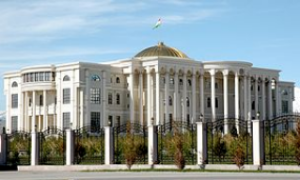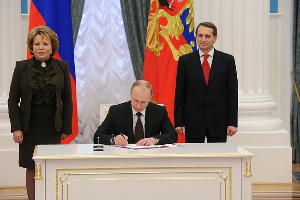Ukraine Crisis and Putin's Post-CIS Integration Plans
By Richard Weitz (04/02/2014 issue of the CACI Analyst)
Although Russia continues to participate in the Commonwealth of Independent States (CIS), the reluctance of Ukraine and other members to support deep integration within that framework has led the Russian government under Vladimir Putin to focus Moscow’s integration efforts on other institutions. Now Russia’s military moves against Crimea have presented both opportunities and challenges for Putin’s post-CIS integration agenda.
Tajikistan's Government Anxious over Crimea
By Oleg Salimov (04/02/2014 issue of the CACI Analyst)
The events in Ukraine and Crimea are a wake-up call for most of Central Asia’s leaders. Although far away from Ukraine, Tajikistan is in the same zone of political and economic influence imposed by Russia. This implies that Tajikistan must consider the possibility of being subjected to a sequence of events similar to those in Crimea. The lack of a comprehensive reaction from Tajikistan’s president, usually supportive of President Putin, to the situation in Crimea can be interpreted as fear that Tajikistan could potentially be absorbed by Russia in part or as a whole. An evaluation of Tajikistan’s political and socioeconomic situation can provide clues to whether Tajikistan is susceptible to a Crimea scenario. 
CACI Analyst, March 19, 2014
Crimea is not a Pawn on the Ukraine Chess Board - Russia is There to Stay
By Avinoam Idan (03/19/2014 issue of the CACI Analyst)
Russia’s move to gain control over the Crimean Peninsula deviates from the context of the crisis in Kiev. Gaining control over Crimea is not a tactic in President Putin’s hands vis-à-vis the competition over Ukraine's future. Crimea is not a pawn on the Ukrainian chess-board in the rivalry between Putin and Obama. The Crimean Peninsula is the “queen” in the chess game Putin is playing; it is aimed at nothing less than improving Russia’s position in the entire Black Sea region, as well as in the area referred to as the Mediterranean Basin.

The Crimean Crisis and Georgia's Breakaway Territories
By Valeriy Dzutsev (03/19/2014 issue of the CACI Analyst)
Russia’s support for the secession of Ukrainian Crimea is likely to affect Abkhazia and South Ossetia, which Russia unilaterally recognized after the brief Russian-Georgian war of 2008. Following the open confrontation with the West over Ukraine's territorial integrity, Moscow is now ramping up its control over Georgia's breakaway territories. Russia's entrenchment in Abkhazia and South Ossetia is linked to the Russian government's general sense of entitlement to the post-Soviet space and the perceived threat of retreating from it. While there are many parallels between how the situation in Crimea evolves and that in the South Caucasian semi-recognized territories, there are also some important differences.







